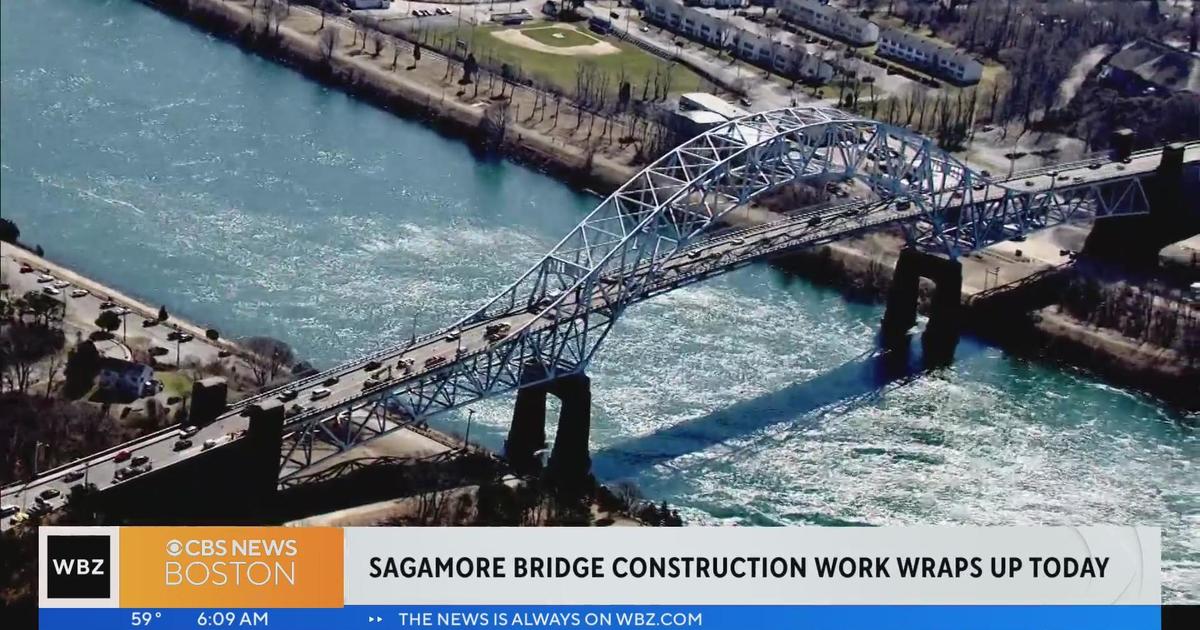Boston, MA
Construction on Sagamore Bridge ends ahead of schedule

Watch CBS News
Be the first to know
Get browser notifications for breaking news, live events, and exclusive reporting.

Boston, MA
Maguire & Caldarone: Bilingual education a must for BPS students

The Boston Public Schools (BPS) enroll students from 139 different countries who speak 66 different languages at home. Roughly one-third of BPS students are classified as Multilingual Learners or English Language Learners (ELs), which means they are not fluent in English and need their instruction augmented in some way.
It’s the “in some way” which is the topic of intense debate both locally and nationally. The Boston Teachers Union (BTU) wants to change the way the BPS teaches EL students. The BTU wants the BPS to end its current practice of having a general education teacher also deliver English language instruction. President-elect Donald Trump recently told Time magazine that he wants to keep only some of the Department of Education operational “just to make sure they’re teaching English in the schools.”
In an effort to help ELs, the BPS recently announced the creation of new dual language programming for the ‘25-’26 school year. At first only 200 students will be served but expansions are planned. These programs range from “newcomers” who do not speak any or only very limited English, to advanced programs in high school where students are eligible to receive the Massachusetts State Seal of Biliteracy upon graduation.
All of these approaches only nibble around the edge of the issue, and even if these programs are faithfully implemented the core issue remains unchanged: American students are at a disadvantage globally if they remain monolingual.
Finland, often hailed as the world exemplar of public education, requires its students to learn four languages by the time they graduate secondary school. Finland has two official languages, Finnish and Swedish. Whatever language a student speaks at home, that student learns the other official language in school. The goal is to have all Finns able to speak to one another in order both to build a national community and to make commerce easier. Then Finns learn two more languages (one of which is usually English).
Over 43 million people in the United States speak Spanish at home (13% of the population). In Boston,16% of the population speaks Spanish. So let’s follow the Finnish model and have all our students – and citizens – understand one another.
Boston already has a few dual-language programs in not only Spanish but also in Haitian Creole, Vietnamese, and American Sign Language. What if Boston simply expanded these programs so that all students in the BPS became proficient in at least two languages?
If this were to happen, then Boston graduates would be in high demand. A 2023 report by The Century Foundation states that bilingual students have better problem-solving skills and improved working memory due to their more active neural networks as a result of their learning two (or more) languages.
There are other benefits of bilingualism such as better social-emotional development and even a potential delay in the onset of Alzheimer’s disease (again due to expanded neural pathways).
Practically speaking, bilingual employees can earn up to 20% more than their monolingual counterparts. Workforce Essentials reported in 2023 that US businesses lose roughly $2 billion annually due to language barriers and cultural misunderstandings. Undeniably our world is becoming more interconnected. BPS graduates who are multilingual would have a great advantage in both college and career.
Boston is already moving in the direction of increased multilingual instruction. In the Dec. 18, 2024 School Committee meeting, BPS interim CFO David Bloom gave a report which stated that over the past year the general education population in the BPS decreased by 22% whereas the number of ELs increased by 11%. Simply put, Boston has to increase its multilingual instruction anyway. Why not go all in?
There are two frequent arguments against bilingual education. One is xenophobia and the other is parsimony. For a “nation of immigrants” it is illogical for us to fear our neighbors’ words and cultures. As for the cost, let us beware of the “bait and switch” of vouchers or school choice.
It is also important to also note that many private/independent schools offer language instruction from Grade 1 through Grade 12. They know that doing so will make their graduates more competitive in college and beyond.
There is no denying that Boston needs to do better by its students. If we continue the current model we will likely continue with the current results. An expansive bilingual program would both improve our students’ lives and attract more families to the district.
Finally we could also help our students and families by having our teachers learn Spanish and/or other languages in their professional development sessions. We can all learn from each other.
Para los estudiantes de hoy, la educación bilingüe es esencial para la universidad, la carrera y nuestra sociedad global. Creemos que todos los estudiantes deberían tener la misma oportunidad de aprender otros idiomas.
(Michael Maguire teaches Latin and Ancient Greek at Boston Latin Academy and serves on the Executive Board of the Boston Teachers Union. Julie Caldarone is the retired Director of World Languages for Boston Public Schools. She currently co-teaches a course entitled, “Spanish for BPS Educators.” The ideas expressed here are their own.)
Boston, MA
Red Sox Icon David Ortiz Urges Boston To ‘Make It Rain’ For Free-Agent Slugger

The Boston Red Sox hive mind doesn’t always come to a perfect agreement on what they want the team to do. That is, of course, unless David Ortiz is asking for it.
A three-time World Series champion, Hall of Famer, and one of the most clutch players of all time, Ortiz is unquestionably on the Red Sox’s all-time Mount Rushmore. Even though he retired in 2016, he’s still closely woven into the fabric of the organization.
Ortiz sees what we all do: this Red Sox team is close to being ready to contend for the playoffs, but there’s one key ingredient missing. He made his feelings known about what he hopes the front office does between now and Opening Day to address that issue.
On Saturday, Ortiz relayed a simple message to the Red Sox: spend whatever it takes to get one more big bat.
“There’s still some guys out there that we can still go for, and I think we have a really good front office,” Ortiz said in an appearance on NESN. “To put a good lineup together nowadays is not that difficult. What you got to do is just make it rain, and you can go pick a few guys. Now pitching, on the other hand, is the toughest thing to put together.
“We got pitching. Pitching can always stop good offenses. The playoff is a playoff pitching (staff) we got right now. We line up a couple of thunders in the lineup to help (Rafael Devers) and the rest of them boys — one good bat would do.”
Ortiz and NESN host Tom Caron both strongly hinted at the end of the interview who that big bat could be: former Houston Astros All-Star Alex Bregman. Manager Alex Cora also signaled earlier in the day that Bregman would be a great fit in Boston.
Bregman isn’t quite Ortiz, but he does have one thing on him: the career record for OPS at Fenway Park. He has a wild 1.245 mark in 98 plate appearances in Boston throughout his career.
When David Ortiz asks for something, the Red Sox would usually be wise to follow through. And it seems he wants Bregman. Will that move the needle in the suites at Fenway?
More MLB: Red Sox Predicted To Land Ex-Padres $28 Million Gold Glover In Free Agency Surprise
Boston, MA
Greater Boston enjoys a light snow, travel not significantly impacted – The Boston Globe

The snow showers come from a weakening system approaching from the Great Lakes that tapped into some of the moisture from a strong storm passing south of New England.
The region was spared the worst precipitation of the storm thanks to persistent sub-freezing temperatures earlier this week, which pushed it south toward its current location off the coast of North Carolina, Nocera said. New England’s light snowfall is on the northern fringes of the storm.
Nocera added that this weekend’s “decorative snow” will not significantly impact ground travel.
The Massachusetts Port Authority issued a travel advisory for flight delays at Boston Logan International Airport. According to the flight tracking website Flight Aware, as of around 1:00 p.m. 212 flights were delayed at Boston Logan and another 15 were cancelled.
Margo Griffin, a teaching associate at the University of Cambridge in England, was initially worried about driving through the snow on her way to get coffee in Cambridge, but said the view from the Charles River was worth the trek.
“I thought it might be a problem, but I just decided to go ahead with the plan, and I’m enjoying walking through the snow,” Griffin said.
Other Boston-area residents who spoke to the Globe Saturday morning were happy to wake up to the winter scene on Saturday.
“I am feeling wonderful about the snow. I haven’t seen it in a long time,” said Barbara Delollis, a communications lead at Harvard Business School.
Delollis already made snow day plans.
“We want to go out and have some fun in the snow, and take a lot of pictures and just remember this moment, because we don’t know how much more snowfall we’re going to see in the Boston area anymore with climate change,” Delollis said.
Talia, a Cambridge resident, said that the snow had no effect on her plans to attend synagogue with her two-year-old son Saturday morning.
“It feels nice and seasonal, which is cool because climate change is terrifying,” she said.
Snowstorms can still occur, despite warming temperatures from climate change, Nocera said. Although Saturday’s snowfall cannot guarantee heavy snow this winter, there is a slightly higher chance of snow towards the end of the month as cold temperatures ease.

Materials from previous Globe stories were used in this report.
-

 Politics1 week ago
Politics1 week agoNew Orleans attacker had 'remote detonator' for explosives in French Quarter, Biden says
-

 Politics1 week ago
Politics1 week agoCarter's judicial picks reshaped the federal bench across the country
-

 Politics1 week ago
Politics1 week agoWho Are the Recipients of the Presidential Medal of Freedom?
-

 Health7 days ago
Health7 days agoOzempic ‘microdosing’ is the new weight-loss trend: Should you try it?
-

 World1 week ago
World1 week agoSouth Korea extends Boeing 737-800 inspections as Jeju Air wreckage lifted
-
/cdn.vox-cdn.com/uploads/chorus_asset/file/25822586/STK169_ZUCKERBERG_MAGA_STKS491_CVIRGINIA_A.jpg)
/cdn.vox-cdn.com/uploads/chorus_asset/file/25822586/STK169_ZUCKERBERG_MAGA_STKS491_CVIRGINIA_A.jpg) Technology3 days ago
Technology3 days agoMeta is highlighting a splintering global approach to online speech
-

 World1 week ago
World1 week agoWeather warnings as freezing temperatures hit United Kingdom
-

 News1 week ago
News1 week agoSeeking to heal the country, Jimmy Carter pardoned men who evaded the Vietnam War draft



















